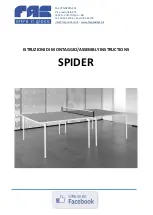
dark squares of the first three rows on their side of the board. The player with the darker
pieces always makes the first move. Moves are made diagonally, and only one move may
be made each turn. You can only move your piece onto an empty square.
If one of your pieces is diagonally adjacent to one of your opponent’s pieces and the
square beyond it is vacant, then you must jump over your opponent’s piece, which is then
removed from the board (captured). You can jump from vacant square to vacant square
several times in a row with the same piece in a single turn, capturing several of your op-
ponent’s pieces. Once a piece has reached the far end of the board, it becomes a king
(this is signified by stacking two checkers on top of each other). A king can move and
jump diagonally both forwards and backwards. Kings can be captured like any other piece.
The Finer Points – You must make your move with the first piece that you touch unless you
have given notice that you intend to arrange your pieces properly in their squares. If you
touch an unplayable piece, you receive a "caution," and if you commit a second offense,
you forfeit the game.
You must take your turn within five minutes. If you fail to move, an appointed time-keeper
will call "time," and you will then have one minute to make your move or you forfeit the
game.
BACKGAMMON
Backgammon is a game for two players. Equipment: A backgammon board, 30 "men"
(also called checkers, stones or counters), at least one (preferably two) pairs of dice, dice
cups, and a doubling cube (for more advanced games). The board should be set up as
shown:
Object of the Game – Move all of your men into your "inner board." You do this by moving
them according to the number shown on the thrown dice. The person who removes all
their men from the board first (called "bearing off") wins.
The Basics – The board is divided into 24 points, with 12 points on each side. Each side is
divided into an inner and outer board. Each inner or outer board is divided into two sec-
tions with each made up of six points. The order of play is determined by rolling one die,
and the player with the highest number goes first. The player moves men using the num
-
bers shown on the two dice using each number individually, not as a total. If the player
throws a double they must move four times the value of the dice. The players continue
rolling in turn – each using their own dice. Both numbers of the roll must be used when-
ever possible. If the player cannot move, play passes to the opponent.
The Finer Points – You can take one of your opponent’s single men on a point (called a
"blot") and replace it with one of your own (called a "hit"). If there are two or more men on
a single point they are safe and cannot be taken (called a "blocked point"). Your opponent
can’t land on a blocked point, but they can move over it. When a man is captured, it is
placed on the bar (also called "jail") and must enter the opponent’s inner table according
to the number thrown on either die before any other move is made. If a man can’t enter
because both points are blocked, the turn passes to the opponent.
All of your men must be in your inner table before you can start bearing off. If possible,
you must use your entire roll. If, for example, you roll a five but have no men on your five
point, you must take a man off the highest point where you have one. If a man in your in
-
ner table is hit while you are bearing off, that man has to go to the bar and re‐enter. You
36
Summary of Contents for 10031862
Page 1: ...Spieletisch mit 34 Spielen 10031863 1 0 1 2 3 4 5 6 7 8 9 1 2 3 4 5 6 7 8 9 10 ...
Page 6: ...Montage Schritt 1 Schritt 2 6 ...
Page 7: ...Schritt 3 Schritt 4 7 H5 H6 H7 F2 F3 F4 F4 F3 F2 F1 H13 H14 H15 H13 H14 H15 H13 H13 ...
Page 8: ...Schritt 5 Schritt 6 8 1 0 1 2 3 4 5 6 7 8 9 1 2 3 4 5 6 7 8 9 10 F7 H8 F5 F6 ...
Page 9: ...Schritt 7 Schritt 8 9 ...
Page 10: ...Schritt 9 10 1 0 1 2 3 4 5 6 7 8 9 1 2 3 4 5 6 7 8 9 10 F8 ...
Page 26: ...Parts List 26 X11 each ...
Page 27: ...27 1 4 X1 BOLT ...
Page 28: ...28 ...
Page 29: ...Assembly 29 ...
Page 30: ...30 H5 H6 H7 F2 F3 F4 F4 F3 F2 F1 H13 H14 H15 H13 H14 H15 H13 H13 ...
Page 31: ...31 1 0 1 2 3 4 5 6 7 8 9 1 2 3 4 5 6 7 8 9 10 F7 H8 F5 F6 ...
Page 32: ...32 ...
Page 33: ...33 1 0 1 2 3 4 5 6 7 8 9 1 2 3 4 5 6 7 8 9 10 F8 ...










































